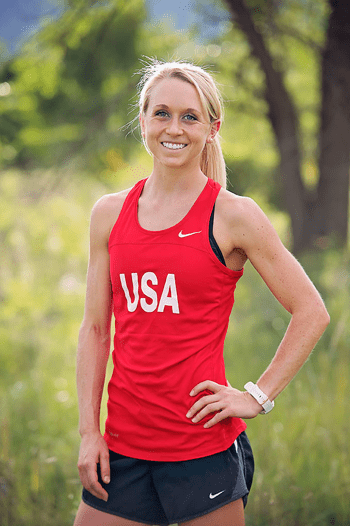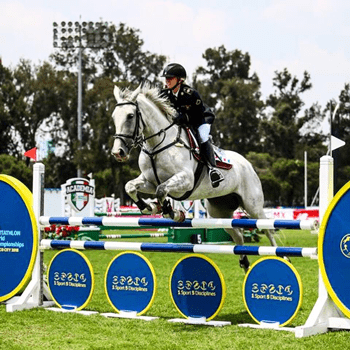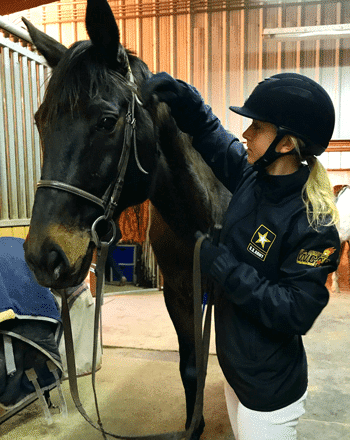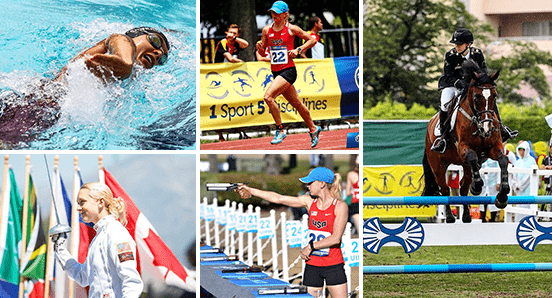How to Connect with an Unfamiliar Horse: An Interview with US Olympian Samantha Schultz

Of all the summer Olympic events, Modern Pentathlon is surely one of the most exciting. That’s because it actually tests athletes on five different sports – stadium show jumping, fencing (sword fighting), swimming, running and pistol shooting. The horse event is especially tough because athletes are given just 20 minutes to warm up on an unfamiliar horse before they have to complete a challenging stadium show jumping course.
Today, we’re excited to share this interview with one of the top pentathletes in the world, Sammy Schultz. This Colorado native and US Army soldier told us the exciting story of how she had to overcome a very difficult mount at the 2019 Pan American Games to qualify for the 2021 Tokyo Olympic Games. Plus, she shared some useful tips so you can personally connect with your own horse even when his personally seems to change from day-to-day.
---
Sammy, thanks so much for joining us! First off, can you tell us how you got started with the sport of Modern Pentathlon?
I got a little bit of a late start. I started in 2010, and so I was a senior in high school. At the time I was running cross country and track, swimming, and doing three-day event team. I had a horse, and just had a weird combination of sports.
I grew up very active group in Colorado, so we were hunting and skiing. We played tennis, and did soccer, and I mean, any kind of sport. I really found my niche with soccer and swimming.
And then I was a little horse, crazy girl when I was younger. Every time we’d drive up to the mountains or go on hunting trips, I’d have my face pressed against the window and I'd be like “Horses, horses!” I still remember that. I just always loved horses.
Pentathlon came on the radar in 2010. A woman who I did eventing with found out that I knew how to shoot, run, swim, and I was riding horses. So she's like, “You need to do the sport at Pentathlon!”
She founded Cheyenne fencing and Modern Pentathlon Club in Denver. I went there, learned how to fence, eventually came to the Olympic Training Center in Colorado Springs, did my first competition in March 2010, and then everything just kind of spiraled from there.
And what do you love so much about the sport?
I think just the challenge. I love the sport because of the diversity, but I also love it because of the challenges. It's like a double-edged sword. There are so many different aspects of it, which I think makes it really fun, but it also makes it like kind of frustrating at times. But I think that's part of the beauty of it.
Can you tell us about the moment when going to the Olympics first crossed your mind?
I think it was probably the first year I did Nationals in 2010. I got second place in youth, and I was 18 at the time. Then I also competed at the junior and senior level the next day, just for the heck of it. I ended up getting bronze at the senior level.
The coaches were like, I think you really have potential in this. For me, I was like, “Ah, I don't know.” Because I had gone to youth world championships and just completely got my butt kicked. I don't think I really thought I had a future until I did nationals and I did so well.
It always fascinates me when anybody has this moment where they decide to do this big huge thing with their life. It's really inspirational.
How does the horse jumping portion of the modern pentathlon work?
For the riding portion of, there's a random draw. You are given a random horse. All these horses that are put into the competition have to pass the jumping test. Two days before the event, they'll do the jumping test, and the horse has to complete the course to a certain ability. The coaches get to watch or the athletes can watch too. They can take notes on all the horses that are in the competition.
Then for the finals, there's 36 athletes, and they'll have 18 horses with a couple of reserve horses just in case something happens. Each horse will get ridden twice.
They'll have a first round, and then a second round. So you will actually be riding the same horse as another athlete, and you may be going first or you may be going second. Depending if you're first or second, it can be an advantage or disadvantage depending on how that goes.
It's basically show jumping. So you're not scored on how you look at all. You just have to complete the course to the best of your ability within the optimum time. If you're over that time, you get time penalties. If you knock a rail over, you get deducted points. Refusals are deducted points. You can fall off once, but if you fall off the second time you are eliminated. And then, you can have two refusals at a jump, and then once you have the two refusals, you skip that obstacle and you go on to the next obstacle.
Each obstacle has a certain amount of points, and you have 15 obstacles to accomplish -- a triple combination and a double combination within that.
When they do the scoring, do they ever take into account what the horses are like?
Everyone's treated same regardless. 300 points is a perfect score. So essentially, you kind of start out with 300 points, and then you're deducted points. If you don't finish or complete within the time, you'll just get a zero.
You mentioned “in the finals, there are 36 people.” Does that mean not everyone gets a chance to ride?
Yes. This last World Cup [Bulgaria 2021] had almost 90 athletes. So we're broken up into 2-3 semifinal groups. In the semifinals, you only fence, swim, and then do the run-shoot. So you do not ride.
You would just need too many horses. It's hard to find horses that can jump that high… that anyone's just going to be like, “Oh, here let this random person from across the country, get on my horse.” That’s definitely a challenge especially here in the US. Europe does a wonderful job. Pentathlon is a lot more popular there.
So yeah, with the semifinals you don't ride. You have to earn your way into the finals, either by placing top 10 in your group, or qualifying based off the points. Then you'll get a day rest. Then for finals, you'll still fence and swim again, then do the horseback riding, and then you'll finish with the run shoot combined event.
Is there one event that is a little more important than the others or a deal breaker for a lot of people? I'm curious if it's the riding portion…
I would say the riding will definitely break you. It doesn't necessarily help you, but if you have a bad ride, it can seriously hurt your score.
All of the events are to me are just as important. You really have to have a solid day to produce results, especially the ride. You just got to find a way to get it done, even if you have a difficult horse. If you're not hitting that 300 or like 290s, it's really going to hurt you.
Wow. Can you tell us about an event where you got on the horse and could tell right away that he was going to be difficult? How did you adjust your riding?

Everyone was having trouble on the course, everyone. I was in the second group. It's hard because you're trying to watch people ride the course to see how it rides. And also too, you want to watch the horse before you go in. The girl that was in the first group for me, she ended up not riding. The horse was too strong for her, and she wasn't a strong enough rider.
So, I was like, “Okay, I have a strong horse. It's fast, but it's a good jumper.” So I was hopeful.
When I got on this little white horse with so much power, I could tell he was very strong. The trainer was there and he was telling me, "Very strong! Very strong!" He didn't speak very good English, so he was trying to communicate the best he could.
He's like, “Make sure after jump… You pull! You pull!” I was like, oh God. Okay. So, we do our first warmup jump and I pull back on the horse. The horse puts his head down and I just fly off. I mean there was no chance for me to hang on at all. So my riding coach, Tracy, she was like, “Oh crap.”
The trainer’s yelling at us and he's like, “No, no, you have to pull on one rein!” I had to almost keep the horse occupied and keeping moving. After I fell off, it was, “Okay, we're going to get through this. I'm going to figure it out.”
I was definitely shaken up a lot, and just kind of figuring it out, and just tried to stay as calm as I could. But also in the background, I kept hearing the bell ring for girls getting eliminated from the ride, or disqualified.
“Oh my gosh, okay, just, don't worry about them. Just worry about you, worry about controlling the horse.” We did a couple more warm-up jobs, and as long as I kept like that strong rein and I would turn quickly after the jumps, I was fine. We got into the course, we got done, and I think I had a perfect score.
If not, maybe like one rail. I mean the horse was jumping all the jobs like super high. He was amazing but, that strong horse, really made me second guess my abilities. I was like, “Oh, well I just fell off, and my Olympic qualification is screwed, I'm not going to make it through.”
A lot of those thoughts can come into your mind during the ride, especially with the challenging horse. And then in the warm-up ring, you have everyone else who's trying to warm up and get to figure out their horse. So, that's a little bit of chaos, and then you go into the ring and you're all by yourself.
Sometimes you'll have a horse that's better in warm up, and then gets anxious out on the course by themselves, or vice versa. But that was definitely one ride that I was just so grateful. At least I got it over with in the warm up and I didn't have to fall off during the competition on the actual course.
And that's the event where you qualified for the Tokyo Olympics?
Yes.
Wow. That's wild.
We all have times when we need to hop on an unfamiliar horse for a ride. Or, sometimes, the horse we own is in a mood when it comes time to tack up. Can you share any tips or techniques you use to have a better connection with a horse?
 A lot of it is just being observant of the horse that day. I try to get to the riding earlier and just stand around the horse to see, are they anxious? Are they like prancing around? Are their ears perked out?
A lot of it is just being observant of the horse that day. I try to get to the riding earlier and just stand around the horse to see, are they anxious? Are they like prancing around? Are their ears perked out?
I guess their personality in that moment. Even too… I feel like when you own a horse, it's going to be different every day. I know when I had a horse, their personalities are all over the board, and so you really have to be observant of what's going on with them.
Are they perky today? Are they anxious? And by me being just around him and not trying to be rushed. I think that was the biggest thing with my warmup and just being around the horse, checking my tack, petting them, just making them feel calm. Because I'm unfamiliar to them too, which is probably a little bit scary having like so much chaos going around.
Once I get on, testing out the cues… what do they respond to? Trying to get them to go faster and slower, the turning cues. I think just observant, and taking your time to adapt to that horse or get used to them, giving yourself enough time to listen to what they're giving you that day.
That's great advice, and you're absolutely right. They can be one horse one day, and a completely different horse the next day.
What is something that you're most proud of with your Pentathlon career?
I'm most proud of my ability to persevere, and to show up every day and work hard.
I want to get better every day, and even having surgeries or injuries, I try to figure out a way to get healthier. How can I eat better? How can I improve my body and my mind to just make those improvements every day?
And so I think I'm proud of just that resiliency to be able to push through pain and those things that have held me back. Being an alternate for Rio [2016 Olympics], having hip surgery in 2012, I mean, just all kinds of like little obstacles that have been placed in my way through that journey, which I think has made me stronger mentally and physically.
What's next for you? How can we follow your career leading up to the Tokyo 2021 Olympics?
So Tokyo, we're less than a hundred days out!
It's kind of getting surreal now, and I'm trying to just put the blinders on a little bit. There is still a lot of worrying concerned with like where the world's at. So I'm really just trying to keep my head down, just try to stay healthy following with all the precautions that we have.
I think you just have to be mindful of what you do when you do it. So for me, just focusing on quality of my workouts, remaining injury-free. We have a World Championships which will be in June, and that'll be in Egypt, so that's kind of on the radar as one last competition that we have leading up to Tokyo.
And then I also have my social media, so Instagram at @SamanthaAUSA, I have posts usually about where I'm going, what trainings like. I try to keep it personable too. Then I also have a YouTube channel, Sammy Schultz. I have some videos of competitions and just trying to kind of do some blogs leading up to the Olympics so that people can kind of see what competitions are like, or what life is like.
I'm still trying to build on that. It's been hard. My husband does have his own job, so he does the video stuff on the side, but it's been fun to have him come to some of the competitions and be able to help document that journey.
That's wonderful. We’re all rooting for you these next few months. And we’re really excited to cheer for you in Tokyo! Thank you so much for taking the time to talk with us!
If you’d like to help support Sammy on her road to the Tokyo Olympics, please considering making a donation on her website at SamanthaKusa.com. Also, watch out for a t-shirt sale in the next few months so you can show your support.


